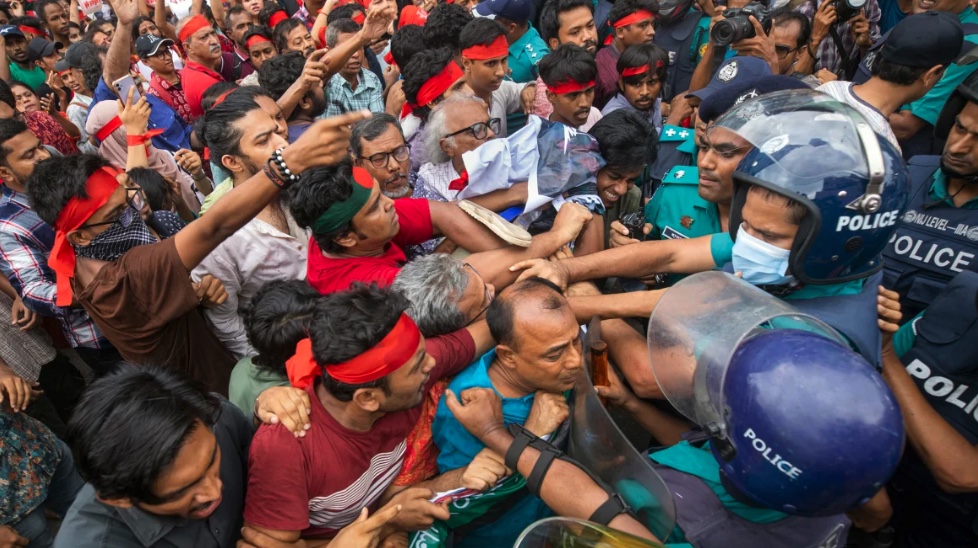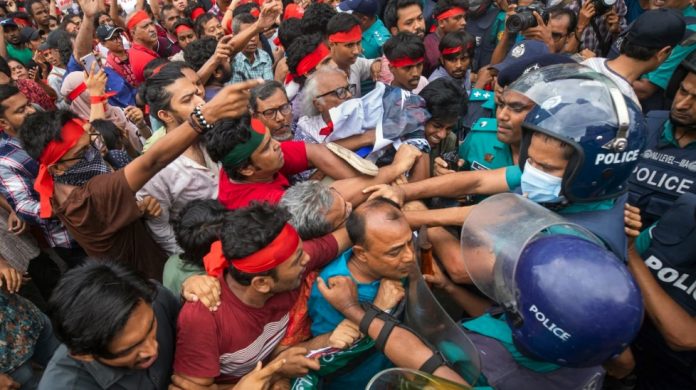เมื่อวันพฤหัสบดี บังกลาเทศสั่งห้ามพรรคจามาต-เอ-อิสลามิ พรรคนักศึกษาอิสลามี ชาตรา ชิบีร์ และกลุ่มอื่นๆ ในเครือ โดยกำหนดให้พวกเขาเป็นองค์กร “ติดอาวุธและผู้ก่อการร้าย” การกระทำนี้เป็นส่วนหนึ่งของการปราบปรามทั่วประเทศในวงกว้าง ภายหลังการประท้วงรุนแรงหลายสัปดาห์ ซึ่งส่งผลให้มีผู้เสียชีวิตกว่า 200 ราย และบาดเจ็บอีกหลายพันคน การประท้วงปะทุขึ้นเนื่องจากระบบโควตางานของรัฐบาลที่มีการถกเถียงกัน โดยนายกรัฐมนตรีชีค ฮาซินา และพันธมิตรทางการเมืองของเธอกล่าวหาว่า ญะมาต-เอ-อิสลามมี และกลุ่มที่เกี่ยวข้องยุยงให้เกิดความรุนแรงระหว่างการประท้วงเหล่านี้ การห้ามดังกล่าวบังคับใช้ภายใต้กฎหมายต่อต้านการก่อการร้าย ดังรายละเอียดในหนังสือเวียนอย่างเป็นทางการที่ The Associated Press เห็น
นับตั้งแต่วันที่ 15 กรกฎาคม ความรุนแรงดังกล่าวส่งผลให้มีผู้เสียชีวิตอย่างน้อย 211 ราย และถูกจับกุมมากกว่า 10,000 รายทั่วประเทศ ระดับของเหตุการณ์ความไม่สงบได้ครอบงำหน่วยงานท้องถิ่น และกระตุ้นให้รัฐบาลตอบโต้อย่างรุนแรงโดยมีเป้าหมายเพื่อระงับความวุ่นวายและฟื้นฟูความสงบเรียบร้อย การปราบปรามครั้งนี้ถือเป็นการยกระดับความพยายามของรัฐบาลในการจัดการกับเหตุการณ์ความไม่สงบที่กำลังดำเนินอยู่ ซึ่งส่งผลกระทบอย่างรุนแรงต่อชีวิตประจำวันและความปลอดภัยของประชาชนทั่วประเทศ
เพื่อตอบสนองต่อคำสั่งห้าม ชาฟิกุร์ เราะห์มาน ผู้นำของกลุ่มจามาต-เอ-อิสลามิ ประณามการตัดสินใจดังกล่าวอย่างฉุนเฉียวว่าขัดต่อรัฐธรรมนูญ และปฏิเสธการมีส่วนร่วมใดๆ ในความรุนแรง เขากล่าวหารัฐบาลว่าเตรียมการสังหารหมู่ผ่านแกนนำของพรรคและกองกำลังของรัฐเพื่อปราบปรามขบวนการที่นำโดยนักศึกษา เราะห์มานอ้างว่าการกระทำของรัฐบาลได้จุดชนวนให้เกิดการประท้วงอย่างกว้างขวางจากครู บุคคลสำคัญทางวัฒนธรรม นักข่าว และผู้เชี่ยวชาญอื่นๆ ที่มองว่าการปราบปรามเป็นรูปแบบหนึ่งของการฆ่าล้างเผ่าพันธุ์ที่นำโดยรัฐบาล การประท้วงเหล่านี้สะท้อนให้เห็นถึงความไม่พอใจที่ฝังลึกต่อการจัดการสถานการณ์ของรัฐบาลและผลกระทบต่อเสรีภาพของพลเมือง
Bangladesh bans the Jamaat-e-Islami party following violent protests that resulted in over 200 deaths.

On Thursday, Bangladesh imposed a ban on the Jamaat-e-Islami party, its student wing Islami Chhatra Shibir, and other affiliated groups, designating them as “militant and terrorist” organisations. This action is part of a broader nationwide crackdown following weeks of violent protests that have led to over 200 deaths and thousands of injuries. The protests erupted over a contentious government job quota system, with Prime Minister Sheikh Hasina and her political allies accusing Jamaat-e-Islami and its affiliated groups of inciting violence during these demonstrations. The ban was enforced under an anti-terrorism law, as detailed in an official circular seen by The Associated Press.
Since July 15, the violence has resulted in at least 211 fatalities and over 10,000 arrests nationwide. The scale of the unrest has overwhelmed local authorities and prompted a severe governmental response aimed at quelling the chaos and restoring order. The crackdown marks a significant escalation in the government’s efforts to address the ongoing unrest, which has severely affected daily life and public safety across the country.
In response to the ban, Jamaat-e-Islami’s leader, Shafiqur Rahman, vehemently condemned the decision as unconstitutional and denied any involvement in the violence. He accused the government of orchestrating massacres through party cadres and state forces to suppress the student-led movement. Rahman claimed that the government’s actions have sparked widespread protests from teachers, cultural figures, journalists, and other professionals who view the crackdown as a form of government-led genocide. These protests reflect deep-seated discontent with the government’s handling of the situation and its impact on civil liberties.
By CNN NEWS

















